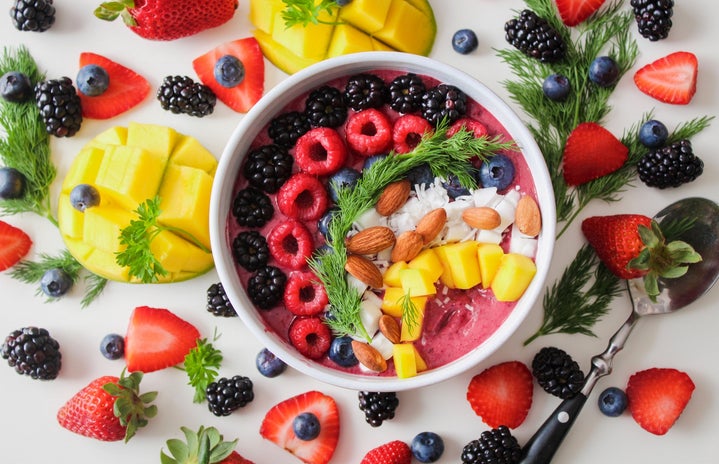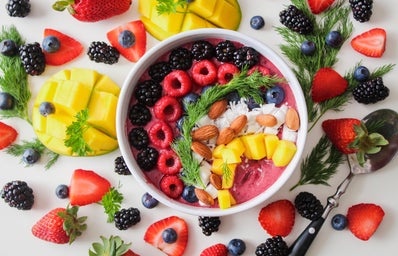Time and time again, online and in real life, I hear people repeat the same sentiments about healthy eating. It’s expensive and not accessible for people on low-income salaries and inversely, eating unhealthy is cheap. I have many problems with this sentiment that has now widely been accepted as a fact in our society. As someone who became vegetarian at the age of 16 and grew up in a low-income household, I can say that this has not been my experience. Instead, I would argue the opposite: eating healthy helped me save money and become more knowledgeable about food. In addition to this, there are many misconceptions surrounding a plant-based diet which people use as an excuse to not question their own eating habits and initiate change. For my new year’s resolution this year, I decided to try a 60 day dairy free challenge (which I’ve been able to stick to so far) in order to decide if I should cut out dairy from my diet, or just consume it in small bouts like I have been doing for the past year. I decided to do this challenge in order to see the impact cutting out diary would have on my skin, energy levels and bloating, concerns which I felt needed to be addressed. One point I would like to stress is how my definition of what I consider to be ‘healthy’ might be different from someone else’s depending on their gender, upbringing, culture, any intolerances or allergies they might have, and their health. As someone with iron deficiency, I try to focus on incorporating iron, magnesium, and fibre into my diet as much as possible, but this can effort can vary depending on stress, my menstrual cycle, and my work life.
A bit of background on myself that I think is important for this discussion: I was born into a Pakistani family, where everyone eats meat and consumes dairy. As a child and even into my teens, I just ate the food my mother prepared for my family, which was mainly vegetarian-based. I had a small meat intake, only choosing to eat chicken, lamb, or fish, which was quite rare and almost always cooked at home (apart from the fish I used to eat on Fridays at school). Because I grew up in a low-income household, and since my parents weren’t familiar with takeout food, I mainly grew up eating home-cooked meals. My mother would prepare Pakistani dishes on a regular basis, such as lentils, mixed vegetables, cauliflower and potato, peppers, and brown rice. In terms of sweet snacks, I favoured rice pudding, vermicelli, and sweet rice over store-bought cakes and biscuits. At the age of 20 I asked my mum to teach me how to cook a variety of Pakistani dishes because, unlike in my first year of university where I relied on ready-made meals from Sainsbury’s, I wanted to become more independent and cook my own food during my second year. I was able to learn these recipes relatively quickly since they all consist of creating a sauce, adding the vegetables of your choice, and letting them cook on low/ high heat. This was a huge game changer for me because it meant I was less reliant on the low-quality, expensive ready-made meals I used to buy and could batch cook, ensuring I have enough food to keep me going for the week. Since I focussed on cooking batch meals rather than one-off meals, I always knew I had food at home which influenced my money habits since it discouraged me from buying food from outside.
This past year I’ve met so many people from a similar cultural background to me who are either vegetarian or vegan, which has been so validating. I remember in conversations with Pakistanis my own age, I would notice how my eating habits differed considerably from theirs, with their meals being highly meat-based. Their diet would be high in protein, whereas my diet is high in carbohydrates consisting of grains, bread, fruit and vegetables, and legumes. I’ve been told to my face that I’m not Pakistani simply because I’m vegetarian, despite the fact I can cook so many ethnic dishes, which just shows how central animal products can be to an individual’s ethnic identity. It can be frustrating having to deal with people’s narrow-mindedness and interrogations and hearing the same questions asked time and time again. For example, people always ask me if I have enough protein in my diet but not once has anyone asked if I consume enough calcium, fibre, magnesium, omega-3, or iron. In recent times, I’ve noticed a greater awareness surrounding gut health and its links to mental health (95% of serotonin is produced here), your immune system, and the development of diseases. Consuming food that is high in fibre has a positive impact on your gut health, as well as getting enough sleep, reducing stress levels, and exercising regularly, and can help minimize symptoms such as an upset stomach, food intolerances, and weight change.
When people consider healthy eating, they think primarily in the short term and don’t really consider its long-term implications. It may be true that buying a packet of sensations, a chocolate bar, or a burger and chips meal from Mcdonald’s is cheap, but these sugary foods will not fill you up meaning you will have to spend extra money buying enough to satisfy your appetite. Cheaply priced food, although charming to the buyer, is poorly produced and does not contain many nutrients, as well as incurring a cost on your health. For example, I make an effort to eat more healthy snacks that are filling such as sliced fruit or cereal bars over a packet of crisps or a slice of cake. Having too much sugary food might mean you’re consuming too many calories leading to weight gain, as well as contributing to tooth decay, and depleted energy throughout the day. As a picky eater, and someone who is transitioning into a dairy-free diet, a lot of sugary snacks are off-limits to me, which encourages me to bake brownies or banana cake. Because I have to make it using soya milk and vegan butter, I don’t do it very often but it still allows me to pacify my cravings. In this way, although healthy eating may seem like the more difficult or expensive option, it does pay off in the long term in terms of improved health and outlook on life.
To conclude this piece, I stick to my original belief that eating healthy is not the more expensive or inaccessible option. You don’t have to buy a £5 salad or survive on fruits and vegetables or give up everything that you are used to eating, but you will have to re-think your diet and think about what foods are not serving your body and your particular needs. It is not an easy option as it will have you reading the food labels all the time, and having to make some sacrifices, but I believe it is ultimately worth it.

